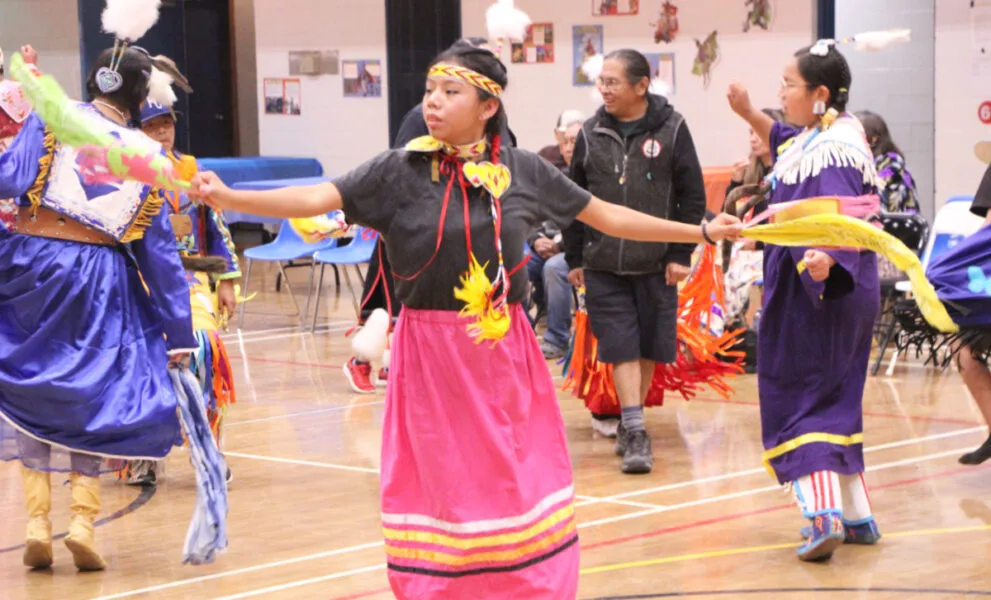Tsq̓éscen̓ First Nation – Tsq̓éscen̓ First Nation is proud to breathe life into their child well-being law, T’k̓wenm7íple7tens re Kíkwe. They have always upheld and practiced their laws, teachings, and responsibilities in caring for, protecting, supporting, and uplifting Tsq̓éscnem̓c (Tsq̓éscen̓ people, “people of the broken rock”). The law, which is an expression of Tsq̓éscen̓ jurisdiction and legislative authority over child and family services, came into force on December 21, 2024.
T’k̓wenm7íple7tens re Kíkwe is a result of decades of work by Tsq̓éscen̓ leadership, staff, and community, with advice and guidance from Tsq̓éscen̓’s Elders and traditional knowledge keepers. It is grounded in Tsq̓éscen̓’s stories, teachings, practices, and language, and centered on the nurturing of connection to family and community. T’k̓wenm7íple7tens re Kíkwe, means “Law of the Valerian Plant” in Secwepemctsín—a plant used traditionally by Tsq̓éscnem̓c to soothe and comfort babies. The law enshrines within it the principle that “re Tsq̓éscnem̓c me7 yecwemíns re xwexwéyt te Tsq̓éscnem̓c ell Secwépemc,” meaning that Tsq̓éscnem̓c have responsibility to guard and care for all Tsq̓éscnem̓c and Secwépemc stsmémelt (children), tutuwíwt (youth), and kwesk̓wséltkten (families) regardless of location. This is consistent with Tsq̓éscen̓’s tradition and practice of going to, providing aid to, and retrieving Tsq̓éscen̓ te stsmémelt ell tutuwíwt in their times of need.
With the coming into force of T’k̓wenm7íple7tens re Kíkwe, Tsq̓éscen̓ can continue this practice through the delivery of Syecwementwécw (dedicated resources, programs, services, supports, and ceremony) for Tsq̓éscnem̓c, guided by the teachings of Xexe7úl̓ecw (a sacred teaching from Tsq̓escenúl̓ecw that emphasizes foresight, preparation, and the responsibility to equip children, youth, and families with resilience and strength to face life’s uncertainties.) Syecwementwécw will be administered and delivered by Tsq̓éscen̓ First Nation’s child and family well-being agency, Élksts re Kíkwe.
As the Northern Secwepemc te Qelmúcw Declaration Author, Matriarch Elizabeth Pete, reminds us: “Ne mitk’y-kt wel me7 yews. Skectels-kuc le q’7es te qelmúcw. Le q’7eses le st’ext’ex7e7m-kt, m-tskexmens le tsuwets ell stselxmems. Tselxem7uysts re ctckten’-kt. Kukwpi7stem es relrats re st’ext’ex7e7m-kt ne sxwexeytes re sw7ec ell tsuwets.’ ‘We carry the blood of our ancestors, and in turn, it is passed down to the next generations. The importance of family is shown and practiced through daily family life—from the Elders to the parents and to the younger generations. Families are proud of their strong roots, are loyal to relationships, and share in the responsibility of caring for children, for Elders, and for those in need. There is a deep sense of respect for the sacredness of body and of life. As Secwépemc, we fight for what we believe in. Mothers, Fathers, Uncles, Aunts, Children, and honoured Elders all participate and contribute to the community and its well-being. The practice of sharing assures that all needs are taken care of. Many Elders are models of traditional teachings meant to secure the well-being and continuance of Secwépemc.”
These words carry the essence of this journey.
“Congratulations to Tsq̓éscen̓ First Nation on the enactment of their child and family services law, T’k̓wenm7íple7tens re Kíkwe. Indigenous children deserve to remain connected to their families and communities. This legislation honours all Tsq̓éscen̓ children and their families whose well-being is inextricably tied to the future of the nation. We look forward to continuing this partnership and concluding a coordination agreement in the near future. This milestone is an important step towards self-government, and for children’s futures.” – Patty Hajdu, Minister of Indigenous Services and Minister responsible for FedNor
Government of Canada









